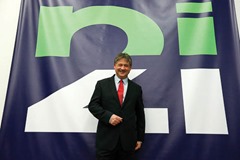NI21 launches as liberal unionist party
 Basil McCrea’s new party is ambitious but faces stiff competition in the centre ground. Peter Cheney reports.
Basil McCrea’s new party is ambitious but faces stiff competition in the centre ground. Peter Cheney reports.
Former Ulster Unionist MLAs Basil McCrea and John McCallister have launched NI21 as a new liberal unionist party. Its first priority is to bring forward a private member’s Bill for a formal opposition in the Assembly.
As party leader, Basil McCrea said that NI21 would be modern, inclusive, “focused on Northern Ireland, committed to the common good and determined to build a better future for all of us.” His priorities included promoting STEM subjects and apprenticeships and increasing voter turnout.
John McCallister explained that the new name was related to the 21st century and Northern Ireland’s forthcoming centenary in 2021.
NI21 distinguishes itself from the Alliance Party as it is openly unionist but its policies, with a cross-community emphasis, are likely to be similar.
Both MLAs had been in talks with the Northern Ireland Conservatives but these broke down after they declined to accept McCrea as their leader. The Tories, though, have since announced a range of council candidates and policies. Belfast solicitor Trevor Ringland, also a former Ulster Unionist, is emerging as their main spokesman.
McCallister and McCrea had left the UUP over unionist unity, claiming that this led to further polarisation and domination by the DUP and Sinn Féin. “This political monopoly by the big two [parties] has not served Northern Ireland well,” NI21’s initial manifesto states. “Self-serving, unproductive and ultimately unsustainable, their time in office has been a failure.”
NI21 also acknowledges that the word unionist has “negative connotations” for many people: “Not everyone who supports Northern Ireland remaining part of the UK can easily associate with the main Unionist parties or all that is associated with Unionist culture.” The party adds that it “does not need to wrap itself in a flag, to provide leadership to the people of Northern Ireland.”
UUP Chairman Reg Empey, though, was highly critical of the new party. Neither MLA, he said, “would have been heard tell of if it wasn’t for the support they got from the Ulster Unionist Party.” Their departure deprived the UUP of Assembly seats in Lagan Valley and South Down. That said, it also ended a long-running dispute between them and Mike Nesbitt, and none of the UUP councillors in their constituencies have followed McCrea or McCallister out of the party.
McCrea and McCallister collectively received 10,180 first preferences in the 2011 Assembly election and they view the large percentage of non-voters (44 per cent) as their main target audience. The party’s first electoral test is expected in the next council and European Parliament elections, both due to take place on 22 May 2014.
Forerunners
NI21 has some similarities to the Unionist Party of Northern Ireland (UPNI), formed by Brian Faulkner in 1974. The UPNI supported power-sharing but had little electoral success and was wound up in 1981.
A previous moderate unionist grouping, the New Ulster Movement, was formed in 1969 and many of its members founded the Alliance Party in 1970. The movement continued as a think tank until its dissolution in 1978.





